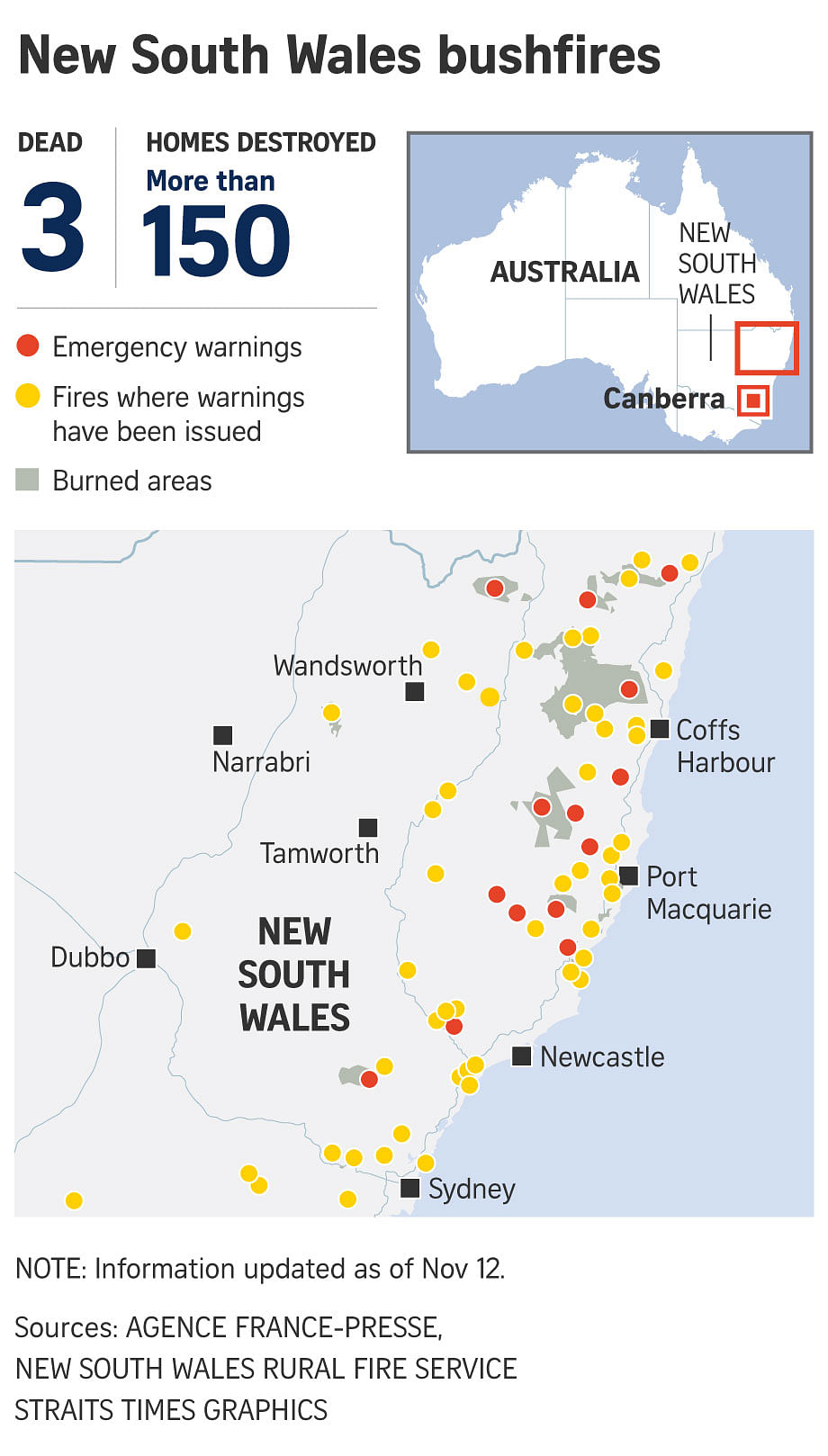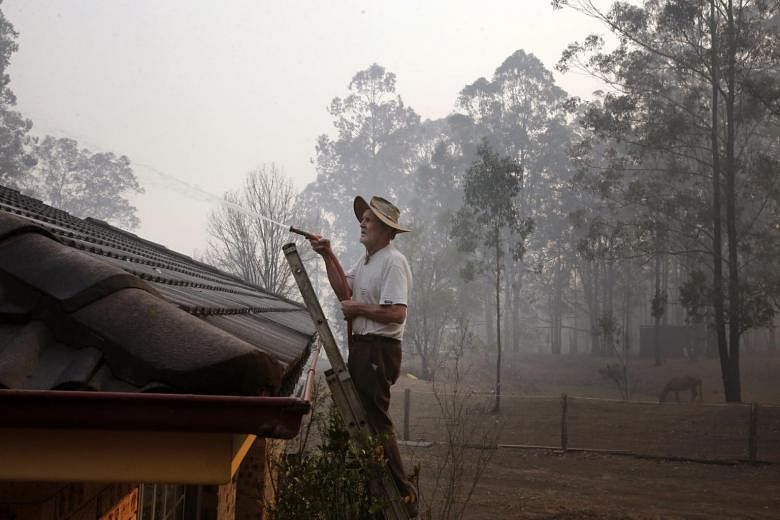SYDNEY (REUTERS, AFP, BLOOMBERG) - Tens of thousands of Australians took shelter on Tuesday (Nov 12) after the authorities warned that it was too late for them to leave their homes as bushfires raged across a vast area of the country's east coast.
Officials issued 14 emergency warnings in New South Wales (NSW), each covering several communities, as more than half the 78 fires across the state burned uncontrolled amid "catastrophic" conditions.
The warnings mean people are in urgent danger and need to take immediate action.
A fire that erupted in Sydney's northern suburbs in the late afternoon immediately cut off exit routes for some residents, a sign of the intensity of blazes erupting in tinder-dry bush.
"Complacency kills - we cannot afford for people to be complacent," NSW Rural Fire Service Commissioner Shane Fitzsimmons, who is providing two-hourly updates on conditions throughout the day, told reporters in Sydney.
"This will only worsen throughout the afternoon as the weather conditions continue to deteriorate, and particularly those strong winds strengthen."
Mr Fitzsimmons said in an afternoon update that a firefighter battling a blaze had suffered a heart attack, although his condition was unknown.
The authorities battled about 10 blazes in mostly northern suburbs of the city, which is dotted with national parks and bushland, often close to homes.
An emergency warning was issued for the affluent neighbourhood of South Turramurra, just 20km north of the central business district, before a plane brought the blaze under control by dumping red fire retardant.
Three people have been killed and more than 150 homes destroyed in the state in recent days - a disastrous and early start to the nation's bushfire season considering summer has not even begun.
As people returned home from work on Tuesday, a smoke haze blanketed Sydney's skyline. Conditions are expected to worsen, with a strong southerly wind forecast to hit the city in the early evening.
Bushfires are a common and deadly threat in Australia's hot, dry summers, but the ferocity and early arrival of this year's severe outbreak have caught many by surprise.
Blazes have been spurred by extremely dry conditions after three years of drought in parts of NSW and Queensland, which many experts attribute to climate change.
In Sydney, home to five million people, the health authorities urged people with respiratory issues to stay indoors as the city was covered by a "hazardous" smoky haze
Lawmakers and firefighters in NSW, where temperatures are expected to reach 40 deg C and winds are forecast to top 80kmh in parts of the state, said they were prepared, but warned there was only so much they could do.
"It's a bit of the calm before the storm at the moment," Prime Minister Scott Morrison told 2GB radio. "Nature will throw some curveballs today, no doubt."
Firefighters warned that the threat to a vast region surrounding Sydney was "off the scale".
Mr Fitzsimmons warned that in current conditions, "if a fire starts and takes hold... we are not going to stop it."
"We have already got significant fires burning in the north coast of New South Wales. A number of those fires are exceeding 100,000 hectares alone. You're talking about a 1,000km fire perimeter."
, Mr Fitzsimmons said about 3,000 firefighters were deployed or on standby.
Seeking to avoid deaths, firefighters have been given broad powers to control government resources, force evacuations, close roads and shut down utilities.
The police and military were helping firefighters with logistics and running water-dropping sorties using more than 80 aircraft.
Around 600 schools and colleges were closed as a precaution and authorities advised anyone suffering respiratory conditions to stay indoors.
NSW Education Minister Sarah Mitchell said nine public schools across the state's north were evacuated.
"Safety is first and we need to evacuate to get the children out of there," Ms Mitchell told the Australian Broadcasting Corporation.
The fires also forced organisers to cancel the season-ending Rally of Australia, which pitted Hyundai against Toyota.
In Queensland state, the danger was not quite as great, with the threat level pegged at "severe", two levels below the"catastrophic" conditions in NSW. Still, some 22 fires were burning across the northern state.
FLEEING BY NIGHT
In the small northern town of Taree, dozens of people moved to a showground that has become a makeshift evacuation centre.
Fifty-nine-year-old Caroline Watson arrived last night with her husband and their dog.
"The fires are just rife. They are absolutely everywhere" she told AFP. "They didn't ask us to get out, but we figured it was coming."
In the Blue Mountains, on the outskirts of Sydney, veteran Winmalee firefighter Alan Gardiner said locals were "terrified and on edge".
The town still bears the scars of a 2013 blaze that destroyed 200 homes, and residents are acutely aware that with few roads in and out of the mountains, a decision to leave too late can be fatal.
Efforts to burn fuel in a controlled way have been limited by months of drought-like conditions that made it too dangerous.
But Mr Gardiner hopes "it's going to be a very quiet day. I'm hoping to get very bored. If there is a fire, it's going to be catastrophic".
To the east in Sydney, the authorities do not expect the city's people to be under direct threat, but a health warning was issued as a cloak of smoke haze drifted into the city.
Australia's deadly blazes in the last week have already spread acrid smoke as far away as New Caledonia.
Ms Sue Johnson, who lives in Sydney's north, helped to move horses from fire-risk areas in outer Sydney to safer ground.
"I brought two horses down in the middle of the night," she said, adding that she cut down vegetation around her home and was ready to fill her gutters with water. "Hopefully none of this will be necessary," she said, but people in the local community are "scared, very scared" of the fire hitting their community.
This bushfire season is in its infancy but is already on track to be one Australia's worst on record.
In New South Wales alone, one million hectares - roughly the area of Jamaica - have already burned, three times more than the whole of the last season.
The current threat has sharpened attention on the policies of Australia's conservative government to address climate change, which the country's weather bureau has said is extending the length of the fire weather season.
Mr Morrison, a vocal supporter of Australia's coal industry, has declined to answer questions about whether the current fires were a result of climate change.
Deputy Prime Minister Michael McCormack sparked a heated debate on Monday when he accused climate activists, whom he called "woke capital city greenies", of politicising a tragedy at the expense of people in the danger zones.


